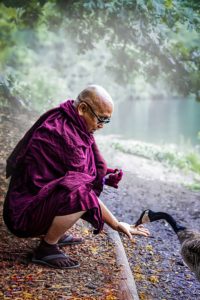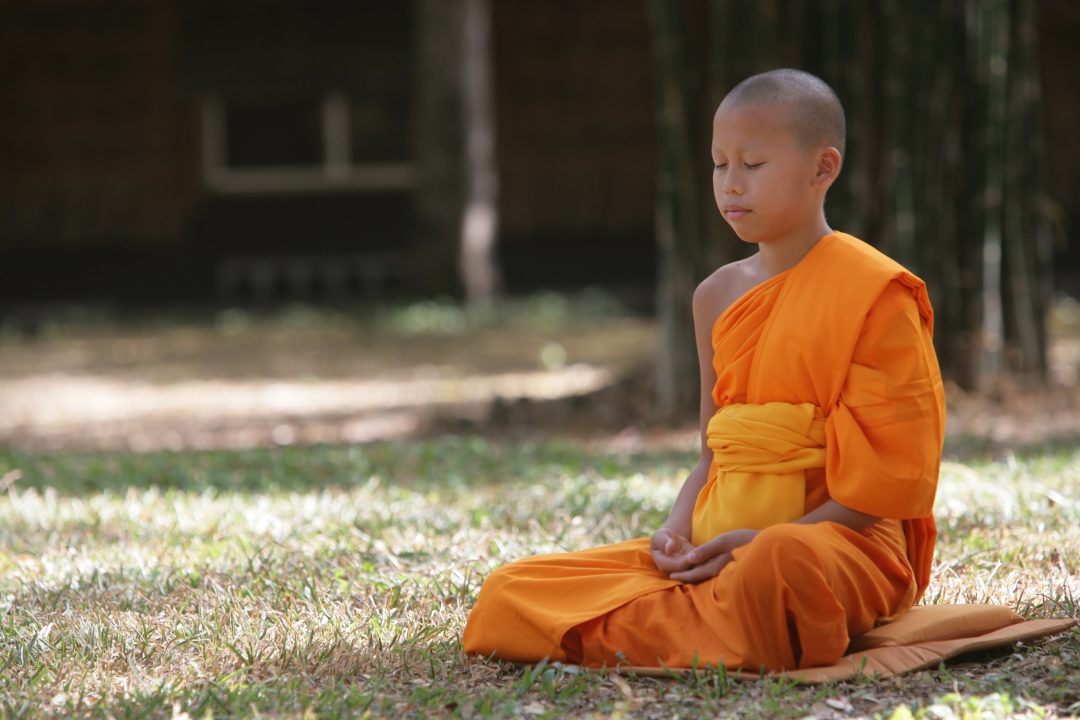As with other major religions, Buddhism has an established moral code, or system of ethical dos and don’ts. For laypeople (Buddhists who are not monks or nuns) this is encapsulated in the five precepts. A precept is a rule about how we should act or conduct ourselves. Monks and nuns adhere to further precepts and adhere to the particular rules laid down by their community. The focus of this chapter is on the precepts as they stand for lay Buddhists and how the first precept, in particular, relates to two contemporary moral issues.
The five precepts are:
- I undertake to abstain from harming living beings
- I undertake to abstain from taking what is not given
- I undertake to abstain from sexual misconduct
- I undertake to abstain from false speech
- I undertake to abstain from intoxicating drugs or drink
A Buddhist aims to adhere to each of these as closely as he or she can.
The First Precept: ‘I undertake to abstain from harming living beings’
Buddhism teaches that one of the most important qualities we should have as human beings is respect for life. For Buddhism, this means not only respect for fellow human beings but also animals and insects. Consequently, it is seen as morally reprehensible to kill another being. There is a hierarchy involved in this, however. To kill a human being is a worse action morally than killing an animal. Killing an animal is seen to be more severe than killing an insect.
 The general approach by Buddhists is to avoid killing or harming any living thing. The Buddhist perspective is that all beings feel pain and suffering, and value their individual existence. Consequently, just as we would not want to inflict pain and suffering on ourselves so too we should not inflict pain and suffering on others. It’s a simple approach. The Buddha explained in the following way: All fear death; comparing others with oneself, one should neither kill nor cause to kill. On top of this empathy with others the Buddha also warns that harming other beings will have karmic consequences: Whoever seeking his own happiness, harms with rod pleasure-loving beings gets no happiness hereafter.
The general approach by Buddhists is to avoid killing or harming any living thing. The Buddhist perspective is that all beings feel pain and suffering, and value their individual existence. Consequently, just as we would not want to inflict pain and suffering on ourselves so too we should not inflict pain and suffering on others. It’s a simple approach. The Buddha explained in the following way: All fear death; comparing others with oneself, one should neither kill nor cause to kill. On top of this empathy with others the Buddha also warns that harming other beings will have karmic consequences: Whoever seeking his own happiness, harms with rod pleasure-loving beings gets no happiness hereafter.
Killing animals, even for food, is also something the Buddha urged his followers not to do. He discouraged hunting as an occupation, for example. This does not mean that Buddhists are all necessarily vegetarian. The Buddha allowed his monks to eat meat as long as the animal had not been specifically killed for them. Indeed the Buddha himself ate meat and it is believed that he died from food poisoning as a result of eating contaminated pork.
The Second Precept: ‘I undertake to abstain from taking what is not given’
This precept is a simple one. Essentially the Buddha asks us not to steal from others. As well as urging his followers to have respect for life, the Buddha also encourages respect for other’s belongings and property. Instead of appropriating what is not given, the Buddha urges he follows to practice generosity and to share what one has with others. Dana or giving is a quality highly regarded in Buddhism.
The Third Precept: I undertake to abstain from sexual misconduct’
In Buddhism, monks and nuns live a celibate life. Lay Buddhists, however, have the freedom to have sexual relationships and to marry. In a modern context, sexual misconduct would cover the following activities: sex with animals, minors, other people’s partners, and prostitutes. It would also include casual sex and sexual assault. The basic moral guideline with sexual activity is that if it brings harm to oneself and/or others then it is to be avoided. In partnerships and marriage, the Buddha encourages mutual respect and fidelity.
The Fourth Precept: ‘I undertake to abstain from false speech’
The Buddha fully understood the importance of speech, its potential for effecting good or ill. He compared speech to a treasure’ which should be uttered at the right moment and be moderate and full of sense. He urged his followers to always speak the truth and to avoid deception and falsehood.
The Fifth Precept: ‘I undertake to abstain from intoxicating drugs or drink’
A great deal of Buddhist practice is about keeping the mind clear and aware. Alcoholic drinks and recreational drugs cloud the mind and impair judgment. Consequently, the Buddha encouraged his followers to abstain. In practice, some Buddhists do drink alcohol but would be guided by the principle of moderation. Medicinal drugs are, of course, acceptable.
The dangers of alcohol are illustrated in the following Buddhist story from Mongolia. A Buddhist monk was traveling from place to place and needed lodging for the night. He came upon a woman who lived alone. She offered him a bed for the night but he had to choose one of three things to sleep with her, kill the goat or have an alcoholic drink.
Thinking that the last option was the least reprehensible of the three, he decided to have a drink. One drink led to another and before long he was very drunk. When he woke up the next morning, he found that not only had he got drunk but he had also killed the goat and slept with the woman.
This story is told to show the dangers of drink. By breaking the fifth precept, he had ended up breaking the first and third too!






